I just finished reading Jan Schaumann's short post on Why Companies Should Pay for Their Employees to Attend Conferences. I liked it. I generally agree with it. But I have more to add.
First off, I think it's reasonable for managers and company leaders to be wary of conferences and events. It is absolutely true that if your employees attend them, there will be costs associated, and it's logical for businesses to seek a return on investment.
What do you sacrifice when sending a team member to an event?
Let's start by attempting to tally up the costs:
- Lost productivity – Usually on the order of 1 to 4 days depending on the length of the event, travel distance, tiredness from travel, whether the team member does some work at the event or makes up with evenings/weekends, etc. Given marketing salaries ranging from $40K–$100K, this could be as little as $150 (~1 day's cost at the lower end) to $1,900 (a week's cost on the high end).
- Cost of tickets – In the web marketing world, the range of events is fairly standard, between ~$1,000 and $2,000, with discounts of 20–50% off those prices for early registration (or with speaker codes). Some examples:
- CTAConf in Vancouver is $999 ($849 if you're an Unbounce customer)
- Content Marketing World in Cleveland is $1,195 (early rate) or $1,395 later
- Pubcon Las Vegas in $1,099 (early rate), not sure what it goes up to
- HubSpot's INBOUND is $1,299 (or $1,899 for a VIP pass)
- SMX East is $1,795 (or $2,595 for all access)
- SearchLove London is $890 (or $1,208 for VIP)
- MozCon in Seattle is $1,549 (or $1,049 for Moz subscribers)
- Cost of travel and lodging – Often between $1,000–$3,000/person depending on location, length, and flight+hotel costs.
- Potential loss of employee through recruitment or networking – It's a thorny one, but it has to be addressed. I know many employers who fear sending their staff to events because they worry that the great networking opportunities will yield a higher-paying or more exciting offer in the future. Let's say that for every 30 employees you send (or every 30 events you send an employee to), you'll lose one to an opportunity that otherwise wouldn't have had them considering a departure. I think that's way too high (not because marketers don't leave their jobs but because they almost always leave for reasons other than an opportunity that came through a conference), but we'll use it anyway. On the low end, that might cost you $10K (if you've lost a relatively junior person who can be replaced fairly quickly) and on the high end, might be as much as $100K (if you lose a senior person and have a long period without rehiring + training). We'll divide that cost by 30 using our formula of one lost employee per thirty events.
Total: $4,630–$10,230
That's no small barrier. For many small businesses or agencies, it's a month or two of their marketing expenses or the salary for an employee. There needs to be significant return on those dollars to make it worthwhile. Thankfully, in all of my experiences over hundreds of marketing events the last 12 years, there is.
What do you gain by sending a team member to an event?
Nearly all the benefits of events come from three sources: the growth (in skills, relationships, exposure to ideas, etc) of the attendee(s), applicable tactics & strategies (including all the indirect ones that come from serendipitous touch points), and the extension of your organization's brand and network.
In the personal growth department, we see benefits like:
- New skills, often gained through exposure at events and then followed up on through individual research and effort. It's absolutely true that few attendees will learn enough at a 30-minute talk to excel at some new tactic. But what they will learn is that tactic's existence, and a way to potentially invest in it.
- Unique ideas, undiscoverable through solo work or in existing team structures. I've experienced this benefit myself many times, and I've seen it on Moz's team countless times.
- The courage, commitment, inspiration, or simply the catalyst for experimentation or investment. Sometimes it's not even something new, or something you've never talked about as a team. You might even be frustrated to find that your coworker comes back from an event, puts their head down for a week, and shows you a brilliant new process or meaningful result that you've been trying to convince them to do for months. Months! The will to do new things strikes whenever and however it strikes. Events often deliver that strike. I've sat next to engineers whom I've tried to convince for years to make something happen in our tools, but when they see a presenter at MozCon show off another tool that does it or bemoan the manual process currently required, they suddenly set their minds to it and deliver. That inspiration and motivation are priceless.
- New relationships that unlock additional skill growth, amplification opportunities, business development or partnership possibilities, references, testimonials, social networking, peer validation, and all the other myriad advancements that accompany human connections.
- Upgrading the ability to learn, to process data and stories and turn them into useful takeaways.
- Alongside that, upgraded abilities to interact with others, form connections, learn from people, and form or strengthen bonds with colleagues. We learn, even in adulthood, through observation and imitation, and events bring people together in ways that are more memorable, more imprinted, and more likely to resonate and be copied than our day-to-day office interactions.
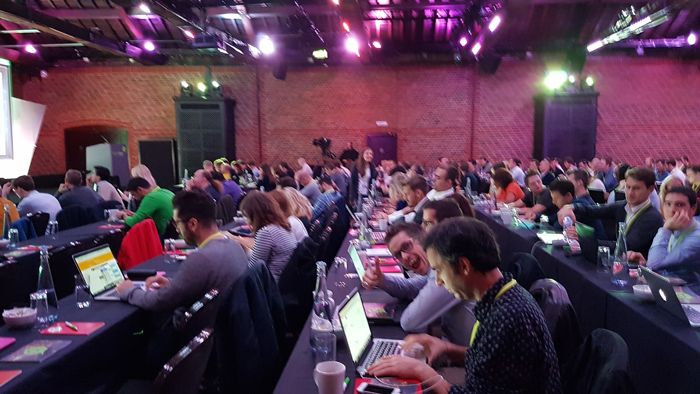
A gentleman at SearchLove London 2016 gives me an excellent (though slightly blurry) thumbs up
In the applicable tactics & strategies, we get benefits like:
- New tools or processes that can speed up work, or make the impossible possible.
- Resources for advancing skills and information on a topic that's important to one's job or to a project in particular.
- Actionable ideas to make an existing task, process, or result easier to achieve or more likely to produce improved results.
- Bigger-picture concepts that spur an examination of existing direction and can improve broad, strategic approaches.
- People & organizations who can help with all above, formally or informally, paid as consultants, or just happy to answer a couple questions over email or Twitter.
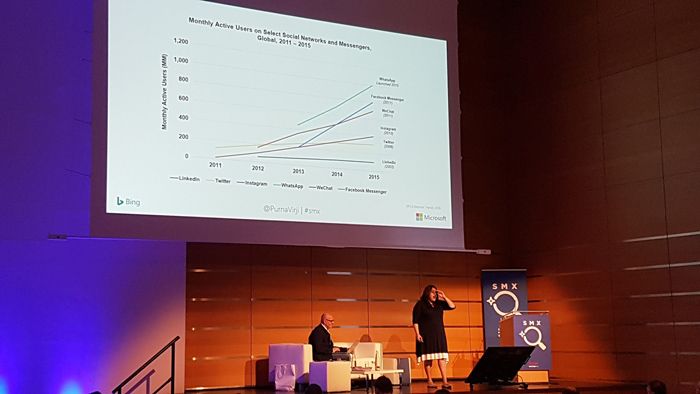
Purna Virji at SMX Munich 2017
In the extension of organizational brand/network, we get benefits like:
- Brand exposure to people you meet and interact with at conferences. Since we know the world of sales & marketing is multi-touch, this can have a big impact, especially if either your customers or your amplification targets include anyone in your professional field.
- Contacts at other companies that can help you reach people or organizations (this benefit has grown massively thanks to the proliferation of professional social networks like those on LinkedIn and Twitter)
- Potential media contacts, including the more traditional (journalists, news publications) and the emerging (bloggers, online publishers, powerful social amplifiers, etc)
- A direct introduction point to speakers and organizers (e.g. if anyone emails me saying "I saw you speak at XYZ and wanted to follow up about..." the likelihood of an invested reply goes way up vs. purely online outreach)
But I said above that these three included "nearly all" the benefits, didn't I? :-)
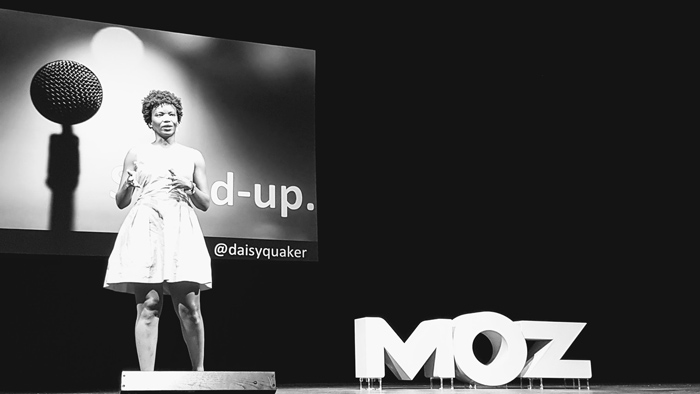
Daisy Quaker at MozCon Ignite
It's true. There are more intangible forms of value events provide. I think one of the biggest is the trust gained between a manager and their team or an employer and their employees. When organizations offer an events budget, especially when they offer it with relative freedom for the team member to choose how and where to spend it, a clear message is sent. The organization believes in its people. It trusts its people. It is willing to sacrifice short-term work for the long-term good of its people. The organization accepts that someone might be recruited away through the network they gain at an event, but is willing to make the trade-off for a more trusting, more valuable team. As the meme goes:
CFO: What if we invest in our people and they leave?
CEO: What if we don’t and they stay?
Total: $A Lot?
How do you measure the returns?
The challenge comes in because these are hard things for which to calculate ROI. In fact, any number I throw out for any of these above will absolutely be wrong for your particular situation and organization. The only true way to estimate value is through hindsight, and that means having faith that the future will look like the past (or rigorous, statistically sound models with large sample sizes, validated through years of controlled comparison... which only a handful of the world's biggest and richest companies do).
It's easy to see stories like "The biggest deals I've ever done, mostly (80%) came from meeting people at conferences" and "I've had the opportunity to open the door of conversations previously thought locked" and "When I send people on my team I almost always find they come back more inspired, rejuvenated, and full of fire" and dismiss them as outliers or invent reasons why the same won't apply to you. It's also easy explain away past successes gained through events as not necessarily requiring the in-person component.
I see this happen a lot. I'm embarrassed to say I've seen it at Moz. Remember last summer, when we did layoffs? One of the benefits cut was the conference and events budget for team members. While I think that was the right decision, I'm also hopeful & pushing for that to be one of the first benefits we reinstate now that we're profitable again.
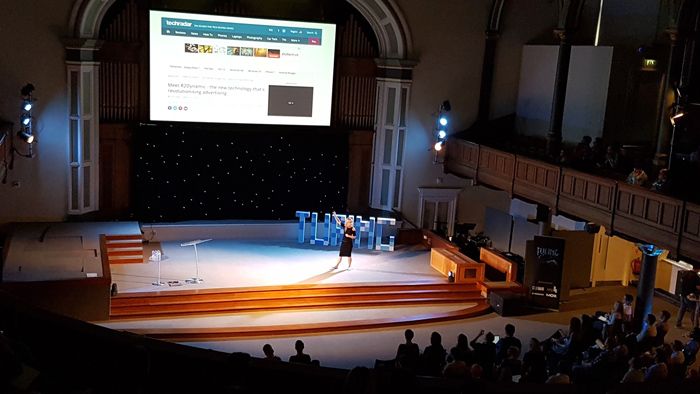
Lexi Mills at Turing Festival in Edinburgh
Over the years of my event participation, first as an attendee, and later as a speaker, I can measure my personal and Moz's professional benefits, and come up with some ballpark range. It's harder to do with my team members because I can't observe every benefit, but I can certainly see every cost in line-item format. Human beings are pretty awful in situations like these. We bias to loss aversion over potential gain. We rationalize why others benefit when we don't. We don't know what we're missing so we use logic to convince ourselves it's ROI negative to justify our decision.
It's the same principle that often makes hard-to-measure marketing channels the best ROI ones.
Some broader discussions around marketing event issues
Before writing this post, I asked on Twitter about the pros and cons of marketing conferences that folks felt were less often covered. A number of the responses were insightful and worthy of discussion follow-ups, so I wanted to include them here, with some thoughts.
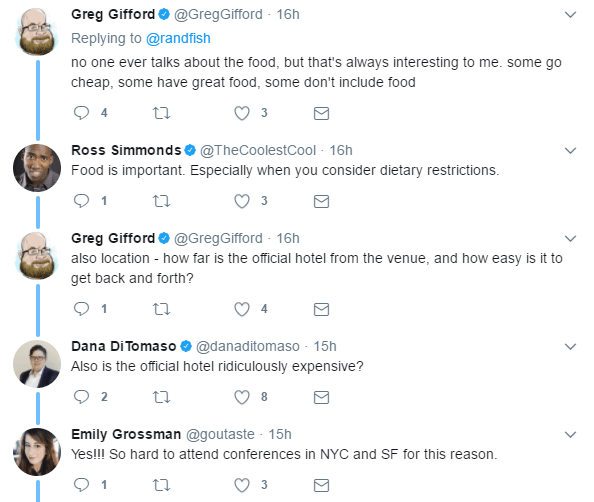
If you're a conference organizer, you know how tough a conversation this is. Want to bring in outside food vendors (which are much more affordable and interesting than what venues themselves usually offer)? 90% of venues have restrictions against it. Want to get great food for attendees? That same 90% are going to charge you on the order of hundreds of dollars per attendee. MozCon's food costs are literally 25%+ of our entire budget, and considering we usually break even or lose a little money, that's huge.
If you're a media company and you run events for profit, or you're a smaller business that can't afford to have your events be a money-losing endeavor, you're between a rock and a hard place. At places like MozCon and CTAConf, the food is pretty killer, but the flip side is there's no margin at all. Many conferences simply can't afford to swing that.
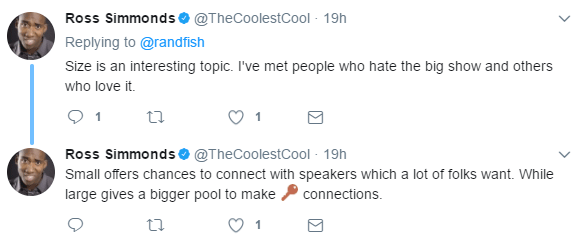
Totally agree with Ross — interesting one, and pros/cons to each. At smaller shows, I love the more intimate connections, but I'm also well aware that for most speakers, it's a tough proposition to ask for a new presentation or to bring their best stuff. It's also hard to get many big-name speakers. And, as Ross points out, the networking can be deeper, but with a smaller group. If you're hoping to meet someone from company X or run into colleagues from the past, small size may inhibit.
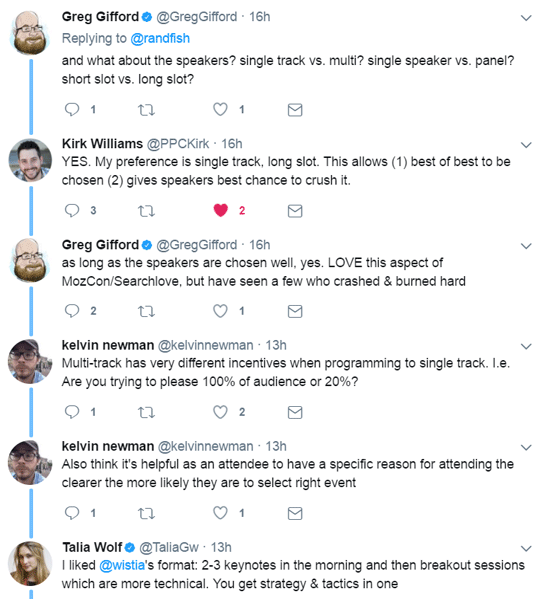
For years prior to MozCon, I'd only ever been to events with a couple keynotes and then panels of 3–6 people in breakout sessions the rest of the day. I naively thought we'd invented some brilliant new system with the all-keynote-style conference (it had obviously been around for decades; I just wasn't exposed to it). It also became clear over time that many other marketing conferences had the same idea and today, it's an even split between those that do all-keynotes vs. those with a hybrid of breakouts, panels, and keynotes.
Personally, my preference is still all-keynote. I agree with Greg that, on occasion, a speaker won't do a great job, and sitting through those 20–40 minutes can be frustrating. But I can count on a single hand the number of panel sessions I've ever found value in, and I strongly dislike being forced to choose between sessions and not sharing the same experience with other attendees. Even when the session I've chosen is a good one, I have FOMO ("what if that other session around the corner is even better?!") and that drives my quality of experience down.
This, though, is personal preference. If you like panels, breakouts, and multi-track options, stick to SMX, Content Marketing World, INBOUND, and others like them. If you're like me and prefer all keynotes, single track, go for CTAConf, Searchlove, Inbounder, MozCon, and their ilk.
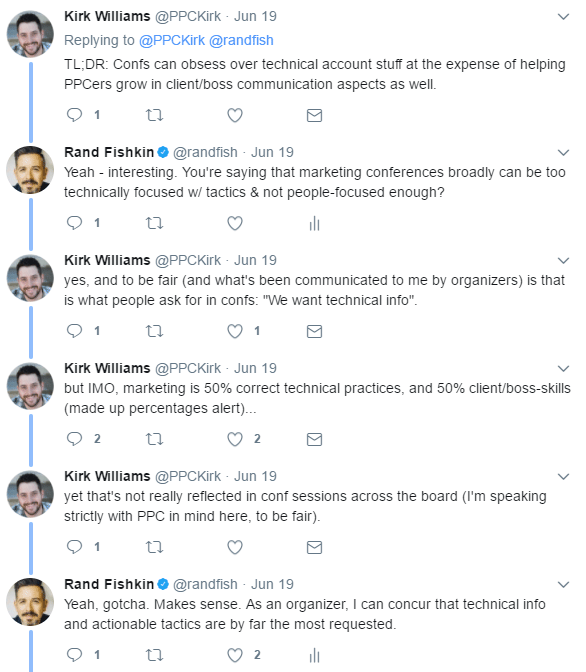
I agree this is a real problem. Being a conference organizer, I get to see a lot of the feedback and requests, and I think that's where the issue stems from. For example, a few years back, Brittan Bright, who now does sales at Google in New York, gave a brilliant talk about the soft skills of selling and client relations. It scored OK in the lineup, but a lot of the feedback overall that year was from people who wanted more "tactical tips" and "technical tricks" and less "soft skills" content. Every conference has to deal with this demand and supply issue. You might respond (as my friend Wil Reynolds often does) with "who cares what people say they want?! Give them what they don't know they need!"
That's how conferences go broke, my friends. :-) Every year, we try to include at least a few sessions that focus on these softer skills (in numerous ways), and every year, there's pushback from folks who wish we'd just show them how to get more easy links, or present some new tool they haven't heard of before. It's a tough give and take, but I'm empathetic to both sides on this issue. Actionable tactics matter, and they make for big, immediate wins. Soft skills are important, too, but there's a significant portion of the audience who'll get frustrated seeing talks on these topics.
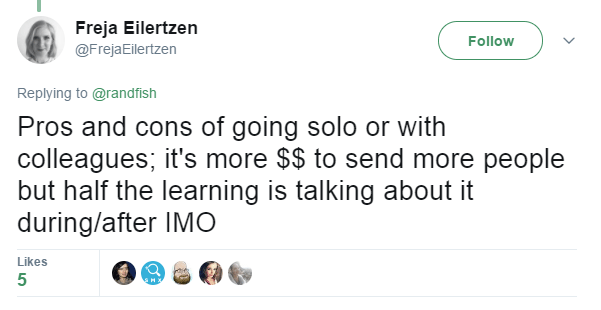
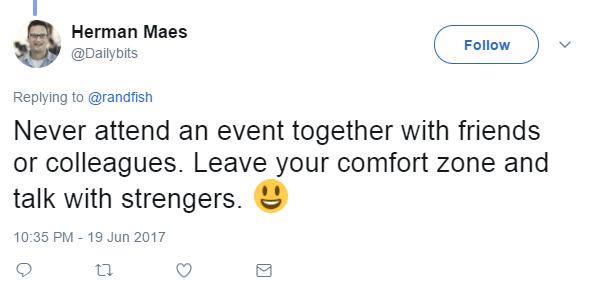
Hrm... I think I agree more with Freja than with Herman, but it's entirely a personal preference. If you know yourself well enough to know that you'll benefit more (or less) by attending with others from your team, make the call. This is one reason I love the idea of businesses offering the freedom of choice on how to use their event budget.
There were a number of these conflicting points-of-view in reply to my tweet, and I think they indicate the challenge for attendees and organizers. Opinions vary about what makes for a great conference, a great speaker or session, or the best way to get value from them.
Which marketing conferences do I recommend?
I get this question a lot (which is fair, I go to *a lot* of events). It really depends what you like, so I'll try to break down my recommendations in that format.
Big, industry-wide events with many thousands of attendees, big name keynotes, famous musical acts, and hundreds of breakout session options:
- INBOUND by Hubspot (Boston, MA 9/25–9/28) is a clear choice here. If you craft your experience well, you can get an immense amount of value.
- Content Marketing World (Cleveland, OH 9/5–9/8) is always a good show, and they've recently focused on getting more gender-diverse.
- Dreamforce by Salesforce (San Francisco, CA 11/6–11/9) has a similar feel to INBOUND in size and format, though it's generally more classic sales & marketing focused, and has less programming that overlaps with our/my world of SEO, social media, content marketing, etc.
- Web Summit (Lisbon, Portugal 11/6–11/9) is even broader, focusing on technology, startups, entrepreneurship, and sales+marketing. If you're looking to break out of the marketing bubble and get a chance to see some "where are we going" and "what's driving innovation" content, this is a good one.
- SMX Munich (Munich, Germany 3/20–3/21 2018) is one of the best produced and best attended shows in Europe. This event consistently delivers great presentations. Because of its location on the calendar, it's also where many speakers debut their theses and tactics each year, and since it's in Germany (or, more probably because it's run by the amazing Sandra & Matthew Finlay), everything is executed to perfection.
Mid-tier events with 1,000–1,500 attendee:
- MozCon by Moz (Seattle, WA 7/17–7/19) I'm obviously biased, but I also get to see the survey data from attendees. The ratings of "excellent" or "outstanding" and the high number of people who buy tickets for the following year within a few days of leaving give me confidence that this is still one of the best events in the web marketing world.
- CTAConf by Unbounce (Vancouver, BC 6/25–6/27) Oli Gardner, who's become an exceptional speaker himself, works directly with every presenter (all invitation-only, like MozCon) to make sure the decks are top notch. In addition, the setting in Vancouver, the food trucks, the staging, the networking, and the kindness of Canada are all wonderful.
- Inbounder (Valencia, Spain 5/2018) This event only happens every other year, but if 2016 was anything to judge by, it's one of Europe's best. Certainly, you won't find a more incredible city or a better location. The conference hall is inside a spaceship that's landed on a grassy park surrounding an ancient walled city. Even Seattle's glacier-ringed beauty can't top that.
- ConversionXL Live (Austin, TX 3/28–3/30) Peep Laja and crew put on a terrific event with a lovely venue and clear attention paid to the actionable, tactical value of takeaways. I came back from the few sessions I attended with all sorts of suggestions for the Moz team to try (if only webdev resources weren't so difficult to wrangle).
- SMX Advanced (Seattle, WA TBD 2018) I haven't been in a couple years, but many search marketers rave about this show's location, production quality, panels, and speakers. It's one of the few places that still attracts the big-name representatives from Google & Bing, so if you want to hear directly from the horse's mouth a few seconds before it's broadcast and analyzed a million ways on Twitter, this is the spot.

Outside The Inbounder Conference in Valencia, Spain
Smaller, local, & niche events with a few hundred attendees and a more intimate setting:
- SearchLove (San Diego, Boston, & London 10/16–10/17) It's somewhat extraordinary that this event remains small, like a hidden secret in the web marketing world. The quality of content and presentations are on par with MozCon (as are the ratings, and I know from other events how rare those are), but the settings are more intimate with only 2-300 participants in San Diego & Boston, and a larger, but still convivial crowd of 4-600 in London. I personally learn more at Searchlove than any other show.
- Engage (formerly Searchfest) The SEMPDX crew has always had a unique, wonderful event, and Portland, OR is one of my favorite cities to visit.
- MNSearch (Minneapolis 6/23) One of the exciting up-and-coming local events in our space. The MNSearch folks have brought together great speakers in fun venues at a surprisingly affordable price, and with some killer after-hours events, too. I've been twice and was very impressed both times.
This list is by no means exhaustive, and I'm certain there are many other events that give great value. I can only speak from my own experiences, which are going to carry the bias of what I've seen and what I like.
Help us better understand the value of conferences to you
Two years ago, I ran a survey about marketing conferences and received, analyzed, then published the results. I'd like to repeat that again, and see what's changed. Please contribute and tell us what matters to you:
Take the survey here
I look forward to the discussion in the comments. If the Twitter thread was any indication, there's a lot of passion and interest around this topic, one that I share. And of course, if you'd like to chat in person about this and see how we're doing things at Moz, I hope you'll consider MozCon in just a few weeks in Seattle.
 Roger's note: *beep* Rogerbot here! I think Rand forgot an important benefit of one conference: At MozCon, you can hug a robot. If you're considering joining us in Seattle this July, we're over 75% sold out! Be sure to grab your ticket while you can.
Roger's note: *beep* Rogerbot here! I think Rand forgot an important benefit of one conference: At MozCon, you can hug a robot. If you're considering joining us in Seattle this July, we're over 75% sold out! Be sure to grab your ticket while you can.


I would definitely add BrightonSEO in the UK to that list of recommendations.
Probably the most authentic event with the least amount of smoke and mirrors I have ever attended.
Several tracks to cater to every interest and without the same names, delivering the same talks over and over again. Plus entry from free to £100, after parties and multiple training workshops.
I agree Danny, i loved Brighton SEO when i went it was brilliant. I went April this year and the weather was fantastic, the people were and the accomodation was brilliant.
I haven't been, but hope to get there. Heard good things.
Kelvin does an incredible job with Brighton - good mix of speakers, range of content and particularly interesting keynotes as they're often outside of the SEO industry so not perspectives you're likely to have seen before.
Tickets are free but we pay thousands to send 10+ staff twice a year. Worth it.
Great article, Rand, I love this topic! We're big on encouraging employees to attend conferences, and we recommend that they even apply to speak at any conference they want to attend anyway. This has lead to some employees speaking at Pubcon, Inbound, and even Mozcon this year! It ends up benefiting everyone:
Showcasing this has been helpful for recruiting as well; candidates knowing that we value continuing education and visibility in the industry is a good selling point.
I always believe that attending any or all of these conferences can definitely help the company and its employees in the following ways:
1. Not only that the employees get to learn something there, but, they become confident about the things that they've already known.
2. Their networking skills get a boost and can develop strong connections
3. When an employee of your company is stuck with some problem, any of those connections can help to have them the solution for your company
4. You never know when you have a good team member from the same strong connections that can help businesses to achieve greater results
5. By attending these conferences regularly, the employee can become a panel speaker soon.This will strengthen the company's reputation among their clients and can generate huge business out of this.
Thus, the moral of the story is attending these conferences regularly is a long term investment that has slow but effective ROI.
What are your thoughts on this, Rand?
Number 3 is so important; I should have more explicitly included that one. Great list Himani
This is a great read!
Having just literally sent my entire team to SearchLove Boston, a lot of these elements crossed my mind. At the end of the day, having the team there for 2 days of deep dive is invaluable. The knowledge, takeaways and networking opportunity amongst your peers is excellent.
From an agency founder perspective, here's some insights on worries, justification and general thoughts:
Justifying the Investment(s): I made the commitment to myself and to my team at the beginning of the year that we were investing in education outside of the keyboard. Of course the numbers are crunched and calculated to understand the direct impact it will have to your bottom line. But if you go into the discussion of attending events and lead with financials, I do not believe you're going about it the proper way anyways.
Having been fortunate to attend a number of great conferences, sitting amongst your peers and drinking from the firehose for multiple days is super beneficial and easily justifies the cost. Sitting behind a keyboard can engage oneself only so much. Period.
Recruitment or Poaching: As Rand pointed out, while it's no secret some attendees have an opportunity to go to a conference, network with others, thus getting recruited. While that might have been their initial intent or not, that's of no concern here. For me at the end of the day if there is another firm out there that saw our team members as very talented to them, that is a factor that is completely out of my control that while it might be on my mind, I cannot let that sway my opinion on the educational value that comes of an event.
Engagement & Expectations: Setting the proper expectations up front is key. You're going to an event to learn, network, etc. Set time aside before and after the daily schedule of events to check in on whatever you need to. That can mean in-person or through great conversations happening via Twitter. This, outside of the financials, is the one that weighs the most on me. How engaged will those attending be in the content shared? We have all been at events where it's very clear who are the engaged vs. non-engaged attendees. Your PPC campaign can wait a few hours, SERPS didn't shift between the time Rand took the stage and Wil dropping RCS. Point is, during the conference, unplug from the day-to-day and try to immerse yourself as much as possible.
Follow Up: It's important to follow up with individuals you sent to an event, or if you yourself went, make the time to share your key takeaways. My team knows I'm not going to ask them to regurgitate the entire 2 days of SearchLove, but it's really great to hear their top takeaways and how it could be actionable for any of the initiatives we're working on.
I know personally and professionally I have found great value in attending conferences both regionally and across the U.S. Hopefully one day I can expand that and make it to a BrightonSEO, Inbounder Spain, etc. Get out there and listen to your peers. Odds are they're struggling with the same things you are, OR it reaffirms what you're doing every day.
As someone from the UK, if I suggested to my boss to send me to the US for 2-4 days for a conference on a subject they know nothing about for £1000s they would laugh me out of the door
I thought that three years ago and luckily my boss agreed as a trial to see what I learnt (went to Mozcon 2015) and been back every year since. Even though I have changed roles since - I can use the things I learnt the previous year to justify it.
Nice! I think you reply is going to screen grabbed and sent to a few bosses :)
So your original boss paid for you to go and then you left?
There are also many options in the UK or near you. They may be a better option for non US people.
Since you mentioned Unbounce's CTAConference, worth noting that the prices you quoted are in Canadian dollars (over 30% cheaper than the USD at the moment) and the super early-bird tickets are only $299 CDN! (No affiliation, just one of my favourite conferences along with MozCon.)
Paul
Good point! I'm going to edit the post. Not sure how I forgot to do the $ conversion.
Hi Rand Very interesting this article, I point out the conferences that you have put in case I can go in a future. In Spain are any celebrated? To part of the Inbounder
I've had some brilliant experiences, some average ones, and some terrible ones. But generally most of the UK conferences I've been to have been more than worth the time and money.
It's often down to meeting people in the flesh, even if I already know them reasonably well online. As well as what I might gain from talks, workshops etc. Even with Brighton SEO generally covering entry-level topics on the main tracks, there's still the odd thing that I might have forgotten or overlooked after being in the business for a while - and generally in the smaller, non-main tracks there are some more advanced lessons to be learned.
But I also gain as much from meeting up in the pub during the day or after the event and discussing not just SEO and marketing challenges, but also other areas (running a business, managing accounts, working with difficult clients, managing staff etc).
The other thing that's been interesting was starting my own meetup group in Peterborough, because as a freelancer I was feeling isolated after just a few weeks. That's not only grown into a sizeable monthly meetup, which is free to attend, and handily has been sponsored almost since the beginning - but also a major STEM Festival every year.
There's a massive benefit to being involved and sacrificing a little time and effort for events like that - whether it's meeting potential clients, working with local organisations that are beneficial for my business, or finding out more about opportunities to develop new business products. Having been attending free events since popping along to some unconferences 10 years or so ago, they're much better value for me than the large free business events that tend to just be sales pitches...
Hi Rand, and thank you for including The Inbounder in your list of recommended conferences.
Being both a conference organizer and a speaker, and I might add an attendee, I find this post and the comments' thread extremely useful in order to improve my very young event.
Your poll, and others, confirm what were also our own non-public ones launched before and after organizing the first The Inbounder and the smaller World Tour events this year.
I think that one of the problem agencies have for allocating a budget for their employees to attend 1 or 2 big conferences per year is, quite redundant, the budget itself.
Sometimes we forget that the majority of the agencies are on the small/boutique side more than medium to big one, and that means that big part of their yearly budget is devoted to tools, clients' works (e.g.: campaigns productions, content production et all) and basic payrolls. That means that budget for conferences is usually reduced.
Sure, post like this one (or the ones I wrote too in The Inbounder website) may offer hints and ideas that can make agencies more keen to send people to conferences.
Regarding the benefit an agency can have from sending people to a conference, surely the educational ones are extremely important, as well the networking and ideally creating serendipity moments that can lead to future clients' acquisition.
As an organizer, then, I know that when I "sell" my event I must consider not only the agenda, the quality of the speakers and the uniqueness of the talks, but also things like:
Finally, yup, creating a checklist of things a team can obtain from a conference is great (as it is this post), but we usually don't let it die as a post, we create it as a landing page for very targeted campaigns via Adwords for Gmail and LinkedIn directed to CMOs only.
UK based here but I have to say the conferences I have attended have been extremely disappointing. Speakers generally over inflate their influence or new product and typically cover ground that has already been covered, so no new ideas to take home.
I am aware of Brighton SEO as having this amazing reputation and at a company we used to employ one of the companies that actually helped organised the event so we had someone in attendance every year - they never once came back with anything that was actionable, or even gave us new ideas, which was extremely disappointing.
Perhaps its a simple case of the US mopping up a large amount of the best speakers!
I think this is a fair point and a common perception.
Brighton in particular, being a free and many-track conference, is often somewhere where relatively junior speakers dip their toe in the water. As a result, even middlingly experienced marketers may learn very little from the talks themselves.
However, Brighton's reputation isn't so strong because of the talks - I go almost every time and I normally come away with something, but it's from the people I talk to between and after the talks, not from the talks themselves.
I love Brighton, but mainly for the networking. Great way to catch up with people every 6 months to share ideas and stories over a pint or two and there usually is one or two amazing speakers, some good and some not so good. Its all about finding the right track
The benefit of having so many tracks is that I can still find at least one talk I don't know much about and learn something even after attending for a few years - plus the preparty/after party is where the value is...
This applies to almost every conference. If you check out the presentations of the "top" speakers on slideshare you'll see they present variations of the same story (stories) on every conference where they present. If you follow them on twitter & read what they write you won't be surprised by what they present. To be very honest - some of these speakers spend so much time on speaking engagements that I wonder when they actually do some real SEO work.
The speakers at Brighton are less experienced (and less polished) in giving talks, and the risk of miss is substantially higher, but you can get some actionable ideas out of it (depending on the track you chose).
I have to disagree with this stereotype. Maybe it was true in years past, but let's look today at some of the "top" speakers. I'll pick just a handful:
Yes, it's true that speakers sometimes re-use a presentation. I usually give a talk 2-3 times myself. But this idea that most big speakers just give the same talk over and over is bunk. And the concept that you can get 90%+ of the value from just seeing the slide deck after it goes up online is, too.
Rand - you've quoted a line of excellent, well-rated speakers who are regularly diving into new, interesting things and have material to share.
The reality is different in a lot of the speaking circuit. Not just the 2-3 times in totally different locations, but same conference after same conference. Particularly at entry level.
We're lucky to have such great speakers in our space who put in the effort.
Agreed - I certainly do see repeat talks from some of the speakers that Rand lists, but mostly that's understandable as I'm unusual in the combination of conferences I visit.
However there are a lot of regular conference speakers out there who have been using variants on the same deck, and nothing else, for well over a year.
sadly far too many, for far too many years...
Thanks Rand. FYI, I only re-use presentations when specifically asked to by the organizers. For example, SearchLove Boston drew heavily on my Engage (Portland) talk because that's what the SearchLove team wanted me to bring. That being said, I always update the decks because things change or I've thought of new ways to present the material based on the previous presentation.
Edited to add: Regarding the point about how do speakers have time to do SEO -- I don't know about other speakers, but when I speak, it isn't just my personal experience. I'm presenting based on what's going on at Kick Point and with our customers. It's a team effort.
I'm occasionally asked to present the same talk - often speakers have specialisms that they're asked to talk about too. Inviting speakers to SearchLeeds I already have an idea where they'll sit in the lineup because I know which areas they work in.
My main point was/is that you never really learn 100% new things - most of the speakers have already tweeted / written about it before (as a reply to Richards point that most speakers cover ground that has already been covered before).
I never claimed the presentations were 100% identical - but they do have common elements which are reused in several presentations - hence the variations of the same stories. A presentation may be different based on the images/examples used but still tell more or less the same story.
Don't know where you have read in my comment that you can get 90% of the value of a presentation from Slideshare. Most people attend maximum 1, maybe 2 conferences a year - so checking a slideshare presentation is "the next best thing" and allows to get a basic idea what the presentation was about even if you didn't attend the conference.
Totally fair points. I overreacted because (clearly!) I'm sensitive about this issue of "speakers just give the same talks over and over" when I think the evidence shows that's not the case.
Hey Rand,
I think complaints about always hearing the same thing are often a combination of people feeling some speakers are re-using presentations AND sometimes different speakers, but essentially the same session content.
Fresh is best, but fresh for the speaker doesn't actually make it fresh for the audience! ;)
Sha
There isn't inherently anything wrong with doing the same talk again, not everyone is going to see it first time my issue is more that when I have been to conferences the majority of speakers will cover ground that has already been done in extreme detail.
A year ago was the last conference I went to and at that conference I remember being told about not siloing SEO and that Mobile would be the future (from different speakers). Whilst not being incorrect as of such it just wasn't worth my time hearing hours worth of talks about these topics.
hi Dirk!!
Two consideration from the two side of the trench:
As a multilingual speaker I do reuse the same deck with the due localization examples when I have to speak in english, Spanish and Italian, and if the conferences are relatively close in time.
I think this is logic and acceptable.
Another justification to using the same deck is also that you speak to audience that are different.... very rarely you'll find someone who saw you speaking in London and then in Seattle (and that's probably me). This "justification" fails totally if the video of your talk is recorded and distributed free.
As a conf organizer... Yes, there "keynotes" who goes on tour with the same deck or two all over the world,. Larry Kim is one of them, for instance but there are also many others.
Personally I don't like speakers at The Inbounder to recycle decks, so I ask them to present a new one when we discuss ideas... and if they are of the kind of creating one or two keynotes per year and then going on tour, I always ask them the exclusivity, making of The Inbounder (both Global and World Tour versions) the first place where they present that keynote
@rand
I completely agree with Dirk and know that many others feel the same way.
I don't think anyone has said that all speakers repeat their talks or even most of them. IMHO the fact that it happens at all is enough to justify the complaint.
I think it's less important for a multi-track event where you can pick and choose, but even then I would be pissed if I heard any speaker give the same talk I have heard before.
People travel thousands of miles to attend these events and at considerable - sometimes personal - expense. To reject this complaint by citing a few examples of speakers that mostly give unique talks seems a little unfair.
Let's put to one side for a moment the many other benefits of attending conferences; networking, catching up with friends, partying etc. The event is sold on the quality of the speakers, not the attendees.
I would also question the degree to which all of those talks you list are truly unique. From a typical SEO conference, I consider myself lucky if I walk away with 2-3 actionable take-aways that I can use directly in my work with clients. That is, I suspect, how most people justify the time and cost of attending to themselves or their boss.
If I see a speaker give the same, or very similar talk, or sheds no new light on a topic that has been covered to death in the blogs, I feel frustrated and a little cheated.
While you may disagree with my view, it is one shared by many other people. I have had several discussions on this very topic with other conference attendees. Whether based on reality or perception, I don't think it helps to simply reject the complaint.
Great breakdown, I was feeling a similar sentiment, but you changed my mind with that list!
"And the concept that you can get 90%+ of the value from just seeing the slide deck after it goes up online is, [bunk] too."
Would you say you can get 30% of the value from going through the slide deck online?
But then would you also say you can get 90%+ of the value from watching videos of the presentation, similar to what Moz and Distilled do? I would imagine so since one would get all the audio, visuals, and tone that go with it, even the audience reactions. Only thing missing would be the energy of being there in person.
I completely agree and I don't think I have ever used the same presentation twice. It is very annoying to see speakers using the same ones again and again. In this day and age, it's harder for speakers to get away with it and get asked back again.
Completely agree with you Lisa.
Great post, Rand - very useful to have the main pros and cons summarised in one place.
I tend to focus on the skills, knowledge and inspiration that you can gain from attending conferences, and treat everything else as a bonus. This makes it easier to weigh up the costs as the time out of the office should result in you improving your own/team's processes or standard of work when you return, and if not, then it's not worth the investment.
Networking, making contacts, brand exposure etc. is obviously important, but you can do that for free or a fraction of the cost at other events, and potentially have more success.
Would love to see more big conferences in the UK, but it's great that BrightonSEO is doing so well and other small conferences are cropping up.
Did you spot SearchLeeds this year Tom?
I did, Stephen. I couldn't make it, unfortunately, but followed along on Twitter and know a few people that attended and they were very impressed! Will certainly be there next year.
Great article about one conferences. We are going to one marketing and seo conference on Friday, and this was very helpful.
Back in 2014 I was feeling pretty down about the company I was working in due to the loss of most of the digital team who had all landed new roles elsewhere within weeks of each other. If it wasn't for the CEO of that company taking the risk of spending over $3,000 for me to fly out to Seattle from Dublin for MozCon, it's likely my career would have taken a completely different path. Not only did I make new friends in the industry, the conference rejuvenated my interest in digital marketing and provided me with pages of tactics to bring back to the company I was working in.
I imagine the value of conferences really depends on what stage of your career you're in. For me anyway, I've gotten a lot out of conferences like MozCon, BrightonSEO and SearchLove - for both learning and networking.
If anything, I find getting out to meet other marketers is enough to keep my passion in digital marketing alive.
Definitely agree Mark. I've said more than once that if SEO was ever taken off my plate I'd still try to make it back down to Brighton twice a year.
I literally purchased my MozCon ticket yesterday after months of debating/trying to make sense of it in the budget. Ultimately, as an independent consultant (that's slowly growing into an agency), I decided it was worth the $3k-ish cost. And that decision was almost entirely based on the opportunity to connect with folks that I already follow/interact with online. No brand partners joining me this year (as I've written about the value of in the past!).
Although I'm particularly excited about the speaker lineup this year, I have to say that I'm usually underwhelmed by the "new ideas" being shared (Edit: not specifically at MC, but at conferences in general). I know asking speakers to present something new for every event simply isn't possible, but with a one-track keynote-style event, I think at least refreshing the presentation a bit more (maybe new examples) would really help those of us who have heard the speaker before not be disappointed.
I also know it's extremely difficult to find the right balance that will satisfy the majority of attendees, but it seems like the technical stuff is usually pretty basic. On that note, I really appreciated Samuel's server logs talk (last year, I think) because it was, at least for me, not something every SEO is doing. And on the topic of polished vs. novice speakers, I have to agree with Wil's comment/your tweet on how some of the best marketers/SEOs out there are the less-than-tenured, more tenacious and younger ones. One of the most actionable tips I took home from MozCon a few years ago was actually from a young woman who was very nervous and obviously newer to being on-stage -- but her PPC tactic was golden and has made a difference in my work.
So the two examples I just shared happen to be a bit more technical -- but some of the soft-skills talks have been some of the most inspiring (Kindra Hall, anyone?!) and equally valuable. The difference, though, is soft-skills are usually freely shared and encouraged, while many of some of the most impactful technical tactics are either considered table-stakes (and not shared at all) or are the things hiding in the back pocket of some of the most successful SEOs.
To me, MozCon and SearchLove have been great investments as they seem to offer the closest thing to the right balance. See all you lucky MozCon attendees in a few weeks!
Great article, some good points. My attititude toward marketing conferences is ambivalent. They're good for networking and picking up new trends and cultural phenomenons however, they can also be an expensive waste of money. Consider all options carefully before attending or sending staff. Learning about marketing is one thing but learning really worthwhile things can only occur at your desk while you test and trial. There's a lot of fakery and jiggery-pokery in SEO especially. Learn what you can yourself online before doing a conference, if you're a newbie.
Really interesting article, now I know that this community is for something more than a SEO.
I´ll take your recommendation about the Inbounder in Valencia. If somebody is comming, I´ll be proud to show my city ;-)
It's one of the most beautiful cities I've ever visited. Can't wait to go back :-)
The home of the real paela! We will wait for you and your crew ;-)
As someone who has never attended a marketing conference, this was extremely informative and helpful in understanding the importance of events like these. Thanks for such a thorough post!
I think going to an event is very important. You exchange opinions with other people, you know new things and also because you do not get out of the routine of being all day in the computer. However it must be pointed out that it is quite expensive and we must evaluate the return. In my case I live in Spain, specifically in Madrid. I work as a freelance and for example I could go to Valencia in the next year. Apart from how the article says this site is great, for everything. But for me is not possible going to Seattle.
Yeah - totally makes sense for you to go where it's geographically feasible, and where budgets can work.
Yep I learn way more in the networking than on the day, often a quick pint with one of the speakers, I tried that and this, because speakers often only get 30m and have to slice the info ... often the best talks are inspiring rather than informative...
Plus, everyone's at different levels, and I've seen it far too often when an awesome talk goes over some people's heads and is just frustrating, other talks are just massively sumpl
Hate those sumpl talks mate...
The best conferences give you a really clear idea of their audience's level of understanding so you can pitch it just right.
The worst conferences say their audience is advanced and they just aren't...and that's reflected in them only accepting more basic talks too.
Unfortunately I've come to see marketing conferences as something of a waste of money, but a necessary evil. I don't believe I've ever got back what has been spent on marketing conferences to date. I have gained some insights and skills - and often the conferences have just served to inspire me to be a better marketer! I find small local networking groups can be much better for getting new ideas and new skills. Plus to many small agencies or companies the costs of the tickets alone can be prohibitive - and that doesn't take into account the costs of travel and loss of productivity.
Does anyone have APAC specific examples of SEO/Digital Marketing conferences?
I'm going to Brighton SEO in September 2017, super excited! I'd like to make it to MozCon next year as well. Martin
And how good will your employee in Valencia have done? LOL
I believe that all training is good and that it is profitable in a period in many cases in the short term
Going to conferences should definitely be looked at as a long-term investment, but should be for the right people who are going to pay attention, network, learn, and then take that experience and use it to be better. Great Pros and Cons analysis Rand!
Great post Rand! I am MozCon bound! It's been 10 years since my last conference, SES San Jose, and I'm overdue for a recharge. My office was on the fence about sending me, so I said I would split the bill, and that did the trick! Remember, if your not willing to invest in yourself, you are in trouble.
Don't forget to get in early, and take in the sights. Seattle has a great CityPass deal that gets you 50% off. I'm getting in 2 days early on Saturday because, hey, it's Seattle Washington! ( I live in the Phoenix desert, so we actually miss the clouds and rain here ;)
Do what you have to do, and go to MozCon 2017, or any conference this year. It's just like any great trip or journey - it changes you and your outlook of the industry.
Regardless of how much money conference organisers make - or don't - often speakers hope to win some business but don't get paid. Lots of people I've met at conferences over the years are genuine people who want to add value to the industry and I'm lucky to be able to message them on Twitter or email them if I need something. I hope people that have met me in that context know that I'd do the same. More valuable than a deck or a video.
So no decent SF Bay Area SEO/marketing specific conferences that are recommended, agree not sure if Dreamforce counts as one?
This is a really interesting read, a few friends of mine will be attending MozCon and we actually talked about most of what you covered. I always imagined the possibility of finding good partnership oppertunities at a strictly SEO to be slim due to everyone more or less doing the same thing. Having never been to an SEO related conference though I cant speak from experience but this article does give me a little more hope.
I think you hit the managerial nail on the head how you summed up costs / benefit. With costs you could apply a methodology and come up with a dollar value of $4,630–$10,230. With rewards you're left with a vague "$A Lot?". There are people who see potential value and rewards. They probably believe that their company will be the one doing the poaching of the high quality employees too. There are other people who only see the negatives, particularly with a dollar sign attached. I have met very few managers who could both sides of this argument. They were either in one camp or the other and just couldn't perceive the counter arguments.
Hi Rand - I give you a ton of credit for time spent writing this article and outlining the details. In order to stay relevant, one must attend conferences at least 1-2 times a year. It's so critical. Missing one year can be a real setback to a brand because they might work off of outdated practices. Namaste, Lisa